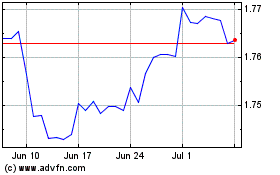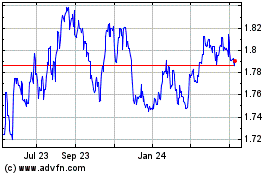Kiwi Slides On Finance Minister English Comments
May 01 2015 - 1:39AM
RTTF2
The New Zealand dollar weakened against the other major
currencies in the Asian session on Friday, following hawkish
comments from the nation's Finance Minister Bill English, who said
New Zealand would have wider budget deficit this year than
previously estimated.
In a pre-budget speech to the Wellington Employers' Chamber of
Commerce, English said the 2014/15 budget would show how very low
inflation would eat into the tax take.
"The Treasury now expects nominal GDP (Gross Domestic Product)
over the next four years through to 2019 to be around 1.5 percent
lower than forecast in Budget 2014 - mainly because of lower
inflation".
"That is about $15 billion less and, to put that in context,
that is more than half of the impact of the global financial
crisis, so these conditions are presenting some real challenges for
the Government's books," he said.
"But at the same time very low inflation and lower commodity
prices mean growth in the nominal economy - which is the dollar
value of what we produce each year - is more muted than expected,"
Bill said.
In other economic news, data from China's National Bureau of
Statistics showed that the manufacturing sector in China continued
to barely expand in April, with a manufacturing PMI score of 50.1.
That beat expectations for 50.0, and was unchanged from the March
reading. It also remained just above the line of 50 that separates
expansion from contraction.
The bureau also said its non-manufacturing PMI came in at 53.4 -
down from 53.7 but still well into expansion territory.
Meanwhile, the Asian stocks were trading lower, following the
weak lead overnight from Wall Street. Investors are also trading
cautiously as they digested a raft of economic data from Japan and
China. Also, many of the markets in Asia are closed on Friday for
the Labor Day holiday. The New Zealand benchmark NZSE 50 index was
falling 20.73 points or 0.3 percent to 5,770.
Thursday, the NZ dollar fell against its major rivals, after the
Reserve Bank of New Zealand's Monetary Policy Board decided to hold
its Official Cash Rate steady at 3.50 percent, in line with
economists expectation.
The NZ dollar fell 1.96 percent against the euro, 0.83 percent
against the U.S. dollar, 0.53 percent against the yen and 2.40
percent against the Australian dollar on Thursday.
In the Asian trading today, the NZ dollar fell to nearly a
2-month low of 1.4786 against the euro and a 1-week low of 0.7568,
from yesterday's closing values of 1.4727 and 0.7613, respectively.
If the kiwi extends its downtrend, it is likely to find resistance
around 1.51 against the euro and 0.73 against the greenback.
Against the Australian dollar, the kiwi dropped to 1.0409 from
yesterday's closing quote of 1.0372. The kiwi may test support near
the 1.05 region.
The kiwi edged down to 90.66 against the yen, from yesterday's
closing value of 90.87. On the downside, 88.70 is seen as the next
support level for the kiwi.
Data from Markit Economics showed that the manufacturing sector
in Japan slipped into contraction for the first time in nine
months, with a revised manufacturing PMI reading of 49.9. That's up
from last month's preliminary April reading of 47.7, although it's
down from 50.3 in March.
Looking ahead, U.K. mortgage approvals for March and Markit's
U.K. manufacturing PMI for April are due to be released in the
European session.
In the New York session, Canada and U.S. manufacturing PMI for
April, U.S. construction spending data for March and U.S.
Reuters/University of Michigan's final consumer sentiment index for
April are due. At 8:30 am ET, U.S. Federal Reserve Bank of
Cleveland President Loretta Mester will deliver a speech on "Issues
in Consumer Credit" before the Conference on Regulating Consumer
Credit in Philadelphia.
Subsequently, San Francisco Fed President John Williams is
expected to speak on "Monetary Policy in Financial Markets: Is
there a New Paradigm?" before the Chapman University Conference in
Orange, United States at 3:45 pm ET.
Euro vs NZD (FX:EURNZD)
Forex Chart
From Mar 2024 to Apr 2024

Euro vs NZD (FX:EURNZD)
Forex Chart
From Apr 2023 to Apr 2024
